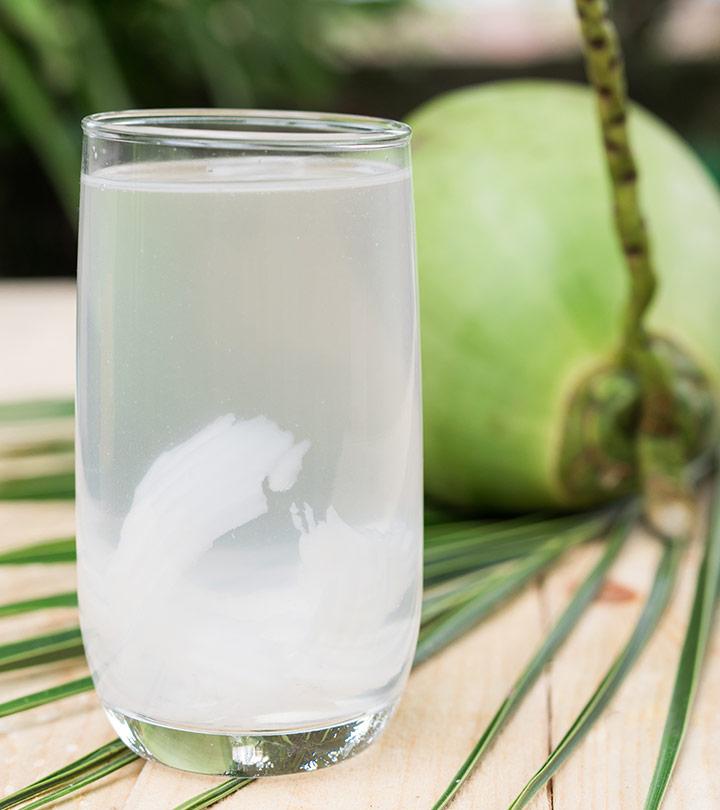Coconut water is incredibly refreshing. This trendy beverage is replete with electrolytes and other essential nutrients.
It works wonders on your health – and no, not just in summers to quench your thirst on a scorching afternoon. From boosting heart health to possibly treating acne, coconut water has a lot to offer.
Table Of Contents
What Makes Coconut Water So Good For Your Health And Skin?
Coconut water is composed of important sugars, vitamins, minerals, amino acids, and phytohormones (plant hormones that control their growth and development). It also contains inorganic ions that boost your body’s antioxidant system (1).
Coconut water may also protect against myocardial infarction or heart attack (1). Regular intake of coconut water can relieve hypertension. The coconut meat (also called copra) can fight inflammation and heal wounds, just like the water (1).
Cytokinins (phytohormones) are important constituents of coconut water. These show promise in cancer treatment, though more research is being done (1).
Probably the most popular use of coconut water is as a sports drink. Research shows us how it compares with commercially sold sports drinks (2).
| PARAMETER | COCONUT WATER | SPORTS DRINK |
|---|---|---|
| Carbohydrates | 4710 | 5800 |
| Calcium | 27 | 1 |
| Phosphorus | 5 | 9 |
| Sodium | 2 | 46 |
| Potassium | 204 | 8 |
| Magnesium | 6 | 3 |
Even the World Health Organization recommends coconut water for treating dehydration – especially in cases of acute diarrhea (2).
There is a lot of research going on focusing on how coconut water can benefit human health. Stating that coconut water is healthy could be an understatement – if you are not totally aware of what it can do for you.
How Does Coconut Water Benefit Your Health And Skin?
1. May Improve Exercise Performance
The electrolytes present in coconut water are key. Coconut water contains more electrolytes than conventional beverages like Cola or Sprite (3).
Coconut water offers hydrating effects similar to the usual carbohydrate-electrolyte sports drinks (4). Its effects on exercise performance were also similar to that of sports drinks. But since coconut water is a natural source of potassium and doesn’t contain added sugars and sweeteners, it might be used as an alternative to sports drinks.
Ingestion of coconut water may also be easier on the stomach as compared to conventional carbohydrate-electrolyte beverages (5). The electrolytes in coconut water can also treat muscle cramps (6).
However, check with your health coach because coconut water is comparatively low in carbs and sodium, two important nutrients for sustaining you through long-duration workouts.
Long-duration workouts cause excess sweat and loss of sodium (and not potassium). If that is what you are up for, you may also supplement with a sports drink (7). You also need extra carbs to sustain yourself – something coconut water contains in a lesser quantity.
For mild hydration and less-intense workouts, coconut water is the best bet. But if you are doing prolonged physical exercise, you must also go for a sports drink. But do check the ingredients and be wary of artificial sweeteners. You can opt for something with low-calorie sweeteners (8).
2. Promotes Heart Health
Rat studies show us that intake of coconut water can reduce blood cholesterol levels (9).
Coconut water fights the increase in total cholesterol levels. At the same time, it maintains the levels of good cholesterol (HDL).
In another study, the cholesterol-lowering effects of coconut water were found to be similar to lovastatin, an OTC drug (10). Though the amount of coconut water used in the study is too much for normal human consumption, the findings are promising.
Tender coconut water can also reduce hypertension. It achieves this by improving antioxidant status and insulin sensitivity (11).
3. May Enhance Digestive Health
The high fiber in the water can offer laxative effects. Coconut water is also a natural diuretic (12).
Coconut water works wonderfully well for treating diarrhea. It contains iron, calcium, magnesium, and manganese and has the same electrolytic balance as your blood (13). Consuming the water within one hour after an episode of diarrhea can help.
Some anecdotal evidence suggests that coconut water can also treat acid reflux. Electrolytes like potassium might promote pH balance in the body. We need more research here, though.
4. Might Help Cure Hangovers
There is less research on this too. Your body loses potassium when you consume excess alcohol (14). Coconut water helps replenish this electrolyte and might cure the horrible hangovers that usually follow.
5. Can Lower Blood Glucose Levels
Coconut water contains L-arginine, a compound known for its antidiabetic properties. L-arginine reduced blood glucose levels in diabetic rats (15).
Coconut water also combats oxidative stress – a condition quite prevalent during diabetes (16). It may also lower the levels of hemoglobin A1c, the higher levels of which increase diabetes risk (17), (18).
You can also make coconut water a part of your diabetes meal (19). It contains fiber and is comparatively low in carbs.
We suggest you only go for unsweetened coconut water. Packaged coconut water may contain artificial sweeteners.
6. May Help Dissolve Kidney Stones
In studies, coconut water intake helped expel excess potassium, citrate, and chlorine from the body (20). This can cut down the risk of kidney stones.
Treatment with coconut water had also prevented crystal deposition in the renal tissue, as per a study. It also had reduced the number of crystals in urine. Additionally, coconut water had prevented oxidative stress in the kidneys and improved renal function (21).
In addition to eliminating kidney stones, coconut water also cures bladder infections. This can be attributed to the antibacterial properties of coconut water (22).
However, there are some gray areas with respect to coconut water and kidney health. Hence, we suggest you check with your doctor before using it for this purpose.
7. May Be Useful For Blood Transfusions
The intravenous use of coconut water is well documented. In a study, coconut water was used as a short-term intravenous hydration fluid for a patient from the Solomon Islands (23).
Coconut water may mimic blood plasma. However, this effect may not last long. This is because of its sodium content – which is not high enough to stay in the bloodstream for long (24). Also, the infusion of coconut water may cause the potassium levels to go up.
8. Might Strengthen Bones
Coconut water is a good source of calcium (13). Hence, it may promote bone health.
9. Helps Treat Acne
Coconut water has antibacterial properties, thanks to the lauric acid present in it (22). These properties might help treat acne.
Lauric acid was also found to exert the strongest bactericidal activity against P. acnes, the bacteria that promotes inflammatory acne (25).
10. Might Help Treat Psoriasis
There is no direct relationship between coconut water and psoriasis. But coconut water can prevent dehydration, which can make your skin more vulnerable to issues like psoriasis (as dehydration prevents your body from eliminating toxins through your skin) (26).
Coconut water is a healthy beverage. Most of its benefits are proven. Some aren’t. But that doesn’t have to stop you from consuming it, especially when it has an impressive nutritional profile.
What Is The Detailed Nutritional Composition Of Coconut Water?
| CALORIE INFORMATION | ||
|---|---|---|
| Amounts Per Selected Serving | %DV | |
| Calories | 45.6(191 kJ) | 2% |
| From Carbohydrate | 35.6(149 kJ) | |
| From Fat | 4.0(16.7 kJ) | |
| From Protein | 6.0(25.1 kJ) | |
| From Alcohol | 0.0(0.0 kJ) | |
| CARBOHYDRATES | ||
| Amounts Per Selected Serving | %DV | |
| Total Carbohydrate | 8.9 g | 3% |
| Dietary Fiber | 2.6 g | 11% |
| Starch | 0.0 g | |
| Sugars | 6.3 g | |
| PROTEIN & AMINO ACIDS | ||
| Amounts Per Selected Serving | %DV | |
| Protein | 1.7 g | 13% |
| VITAMINS | ||
| Amounts Per Selected Serving | %DV | |
| Vitamin A | 0.0IU | 0% |
| Vitamin C | 5.8 mg | 10% |
| Vitamin D | ~ | ~ |
| Vitamin E (Alpha Tocopherol) | 0.0 mg | 0% |
| Vitamin K | 0.0 mcg | 0% |
| Thiamin | 0.1 mg | 5% |
| Riboflavin | 0.1 mg | 8% |
| Niacin | 0.2 mg | 1% |
| Vitamin B6 | 0.1 mg | 4% |
| Folate | 7.2 mcg | 2% |
| Vitamin B12 | 0.0 mcg | 0% |
| Pantothenic Acid | 0.1 mg | 1% |
| Choline | 2.6 mg | |
| Betaine | ~ | |
| MINERALS | ||
| Amounts Per Selected Serving | %DV | |
| Calcium | 57.6 mg | 6% |
| Iron | 0.7 mg | 4% |
| Magnesium | 60.0 mg | 15% |
| Phosphorus | 48.0 mg | 5% |
| Potassium | 600 mg | 17% |
| Sodium | 252 mg | 11% |
| Zinc | 0.2 mg | 2% |
| Copper | 0.1 mg | 5% |
| Manganese | 0.3 mg | 17% |
| Selenium | 2.4 mcg | 3% |
| Fluoride | ~ | |
*Values sourced from USDA database, nuts, coconut water
This shows coconut water is replete with most of the essential nutrients. But does this mean you can have as much of it as you want?
Probably not.
How Much Coconut Water Can You Take In A Day?
Let’s start with why. Why do you need to keep a check on the amount of coconut water you consume in a day?
This takes us to the case of a 42-year-old man who developed dangerously high potassium levels, which eventually lead to abnormal heart rhythms and temporary unconsciousness (27).
He had reported drinking eight 11-ounce bottles of coconut water in a single day. He was rushed to the hospital where he underwent treatment.
Excess intake of coconut water can cause severe hyperkalemia (potassium toxicity) (27). Eight ounces (about 226 grams) of coconut water contains about 600 mg of potassium. The RDA for potassium is 2,600 mg to 3,400 mg (28).
Water from a single coconut yield amounts to about 206 grams. This means drinking the water from an average-sized tender coconut must give you about 515 mg to 600 mg of potassium (29).
If you have chronic kidney disease or diabetes, you must take extra caution (30). Have water from one tender coconut once every two days after consulting your doctor.
There is not enough data on the daily upper limit for coconut water. But, looking at the statistics we just discussed, stick to one tender coconut a day. Lack of potassium is rare, and you might be getting enough of it through your diet (31).
Also, sipping through the coconut fruit is not the only way to consume coconut water. There are other ways too.
How Else Can You Take Coconut Water?
If plain coconut water is boring, we have something for you. Dubbed the Coconut Lemon Quench, this recipe is as hydrating and refreshing as it gets.
What You Need
• 2 tablespoons each of fresh lemon juice and lime juice
• 1 ½ cups of coconut water
• 1 tablespoon of honey
• ½ teaspoon of grated ginger root
• A pinch or two of sea salt
Directions
1. Blend all the ingredients in a blender.
2. Serve or store in the refrigerator for up to two weeks.
We also suggest you eat the coconut kernel and not just drink the water. The kernel protein can lower cholesterol levels. It also decreases the metabolism of fat in the liver and intestine (32).
But even before you think of drinking the water or eating the kernel, you need to know how to pick the right coconut.
What Is The Best Coconut Water To Buy?
Coconut water in a fresh, green coconut is the best bet. It contains no added sugars or preservatives.
Steer clear of those with a hard brown shell. This indicates maturity. The young green ones contain a larger supply of the water.
You can shake the fruit to gauge the amount of water it contains.
Follow these tips, and you are good to go. You can enjoy a fresh green coconut every single day.
Coconut water might also have certain undesirable effects on some people.
What Are The Side Effects Of Coconut Water?
- Concerns With Cystic Fibrosis
Cystic fibrosis is an inherited disorder that damages the lungs and the digestive system. This condition can lower salt levels in the body, requiring patients to take pills or fluids to boost blood sodium levels.
If you have cystic fibrosis, please do not depend on coconut water alone for your sodium intake as it contains less of it. The best way to go about it is to take coconut water with a pinch of salt (33).
- May Cause Hyperkalemia
We have discussed this already. Excess intake of coconut water can cause hyperkalemia (27). Please limit your intake to one tender coconut a day.
- Might Cause Kidney Issues
Yes, coconut water can help treat kidney stones. But individuals with chronic kidney disease must avoid coconut water due to its high potassium levels (34).
- May Lower Blood Pressure Way Too Much
Coconut water lowers blood pressure. So, there is a possibility it may lower the levels too much if you are already on medications for lowering blood pressure. Consult a doctor.
- May Interfere With Blood Pressure Control During Surgery
Due to the above-mentioned reason, coconut water might interfere with blood pressure control during surgery. This is important as blood pressure has a role to play in surgery. Avoid consuming coconut water at least two weeks before a scheduled surgery. Also, talk to your doctor about any blood pressure medications that you take (35).
Conclusion
Coconut water is undoubtedly one of the healthiest beverages on the planet. It is a powerful source of electrolytes that offer a range of benefits. But just keep in mind not to overconsume it. Just one tender coconut a day must do.
Do you already consume coconut water? Have you noticed any benefits? Do share with us by leaving a comment in the box below.
Expert’s Answers For Readers’ Questions
Is coconut water keto?
It depends on your daily carb intake. If it is beyond 20 grams, we don’t recommend you take coconut water. Water from a single coconut yield may give you about 40 calories, which could be a lot on a keto diet.
Is coconut water a probiotic?
Coconut water, by itself, is not a probiotic. But fermented coconut water, also called coconut water kefir, is one. You can easily ferment coconut water with kefir grains.
Is coconut water safe during pregnancy?
Yes. But stick to one tender coconut a day. Also, take your doctor’s advice.
How long does coconut water last?
About 1 to 2 days, when opened after refrigeration. We suggest you store it in the refrigerator and consume within 1 to 2 days.
How is coconut water different from coconut milk?
While coconut water is the naturally available clear liquid inside a fresh coconut, coconut milk is manufactured. The milk is made grating the coconut meat and squeezing out the juice.
References










